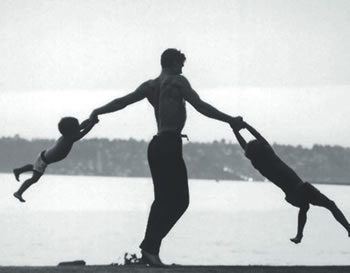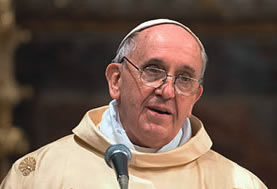Fathers and Grandparents
Vatican City, 28 January 2015 (VIS) –
Pope Francis, returning to the theme of the family, dedicated the catechesis of today's Wednesday general audience to the figure of the father: “a word dear to us as Christians, more than any other, as it is the name with which Jesus taught us to call God,” he said to the thousands of faithful gathered in the Vatican's Paul VI Hall.
“Father is a universal word, known to all. It indicates a fundamental relationship that is real and ancient as the history of mankind. Today, however, we have reached the point of affirming that ours would be a 'society without fathers'. In other words, in particular in western culture, the figure of the father would be symbolically absent, to have vanished. … At first, this was perceived as a form of liberation: freedom from the father-master, from the father as the representative of a law imposed from the outside, from the father as the censor of the happiness of his children and an obstacle to the emancipation of the autonomy of the young. Indeed, in the past in some cases authoritarianism, indeed even oppression reigned in some homes: parents who treated their children like servants, who did not respect the personal needs of their growth, fathers who did not help them to embark on their path in freedom, to assume their own responsibilities for building their future and that of society.”
“And, as often happens, we have passed from one extreme to the other. The problem of our times no longer seems to be the invasive presence of fathers, but rather their absence. … Fathers are so focused on themselves, on their work and at times their personal fulfilment, that they even forget their families, leaving children and the young to their own devices. … Now, on this shared path of reflection on the family, I would like to say to all Christian communities that we must be more careful: the absence of the paternal figure in the life of children and the young produces lacunae and wounds that can be very serious. And in effect the deviances of children and adolescents may to a considerable extent be due to this lack of examples and authoritative guidance in their everyday life, to this lack of closeness and love from their fathers.”
“The feeling of orphanhood experienced by many young people is more profound than we might think. They are orphans in their families because their fathers are often absent, also physically, from the home, but above all because when they are present, they do not act like fathers: they do not speak with their children, they do not give their children, by their example accompanied by words, those principles, those values, those rules for life that the young need in the same way as they need bread. … At times it seems as if fathers are not sure what position they should occupy in the family, or how to educate their children. And so, in doubt, they abstain, they withdraw and neglect their responsibilities, possibly seeking refuge in an improbable relationship of parity with their children.”
The civil community with its institutions too has “a certain responsibility towards the young, that might be described as paternal.” the Pope added: “a responsibility that at times it neglects or exercises poorly. This too leaves them as orphans, and does not offer them true prospects. The young are therefore orphaned of sure paths to follow, orphaned of teachers in whom they can trust, orphaned of ideals to warm their hearts, orphaned of values and hopes that support them day by day. They are filled with idols but robbed of their hearts; they are driven to dream of enjoyment and pleasure, but they are not given work; they are deluded by the god of money and denied true richness.”
“Therefore, it is good for all of us, fathers and children, to listen once again to the promise that Jesus made to His disciples: 'I will not leave you orphans.’ Indeed, He is the path to follow, the master to listen to, the hope that the world can change, that love will conquer hate, that there can be a future of brotherhood and peace for all,” Francis concluded. He added that next Wednesday he will further pursue this theme, focusing on “the beauty of paternity.” “For this reason I have chosen to begin with the darkness in order to reach the light.”
The Pope Speaks to Grandparents
A Church that defies throw-away culture with the embrace of the young and the elderly.
Vatican City, 11 March 2015 (VIS) – The value and importance of grandparents in the family was the theme of Pope Francis’ catechesis during this Wednesday’s general audience in St. Peter’s Square.
Firstly, Francis affirmed that he was able to identify with grandparents as he is of the same age. “When I was in the Philippines, the people called me ‘Lolo Kiko’, or rather, ‘Grandpa Francis’,” he said, emphasising that although society tends to reject the elderly, the Lord does not: on the contrary, He calls us to follow Him in all stages of life as old age too “contains a grace and a mission, a true vocation.”
“However, it is not yet the time to ‘set down our oars’,” he said. “This period of life is different to those that preceded it, without doubt; we must also reinvent it a little since our societies are not yet ready spiritually or morally to accord it its full value. Previously, in fact, it was not normal to have so much free time; today far more so. And even Christian spirituality has been taken a little by surprise, and has had to delineate a spirituality for the elderly. But thanks to God there is no lack of testimonies from elderly saints!”
The Pope gave the example of the elderly Simeon and Anna, who awaited the arrival of Jesus in the temple for many years, and who were resigned to dying before seeing Him, even though that long wait had occupied all their lives and had been their most important commitment. However, when Mary and Joseph arrived in the Temple in compliance with the Law, the burdens of age and their long wait disappeared in an instant. “They recognised the Child, and discovered a new strength, for a new task: to give thanks and to bear witness to this Sign of God. Simeon improvised a beautiful hymn of jubilation and Anna became Jesus’ first preacher, as Luke tells us in his Gospel: she began ‘to speak of him to all who were waiting for the redemption of Jerusalem’.”
“Dear grandparents, dearly elderly,” exclaimed the Pope, “let us follow in the wake of these extraordinary old people! Let us too become poets of prayer: let us acquire the taste for seeking new words, reappropriating those that the Word of God teaches us. The prayer of grandparents and the elderly is a great gift for the Church. It is a great injection of wisdom for all society, especially for those who are too busy, too encumbered, too distracted. Someone has to sing the signs of God for these people too, to proclaim the signs of God.”

 Entries(RSS)
Entries(RSS)